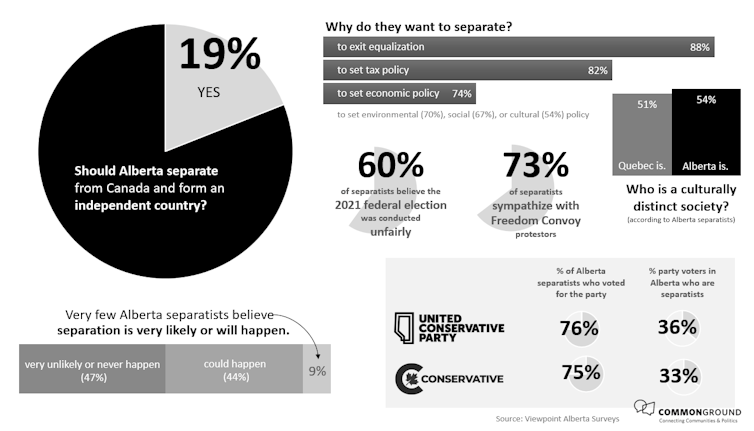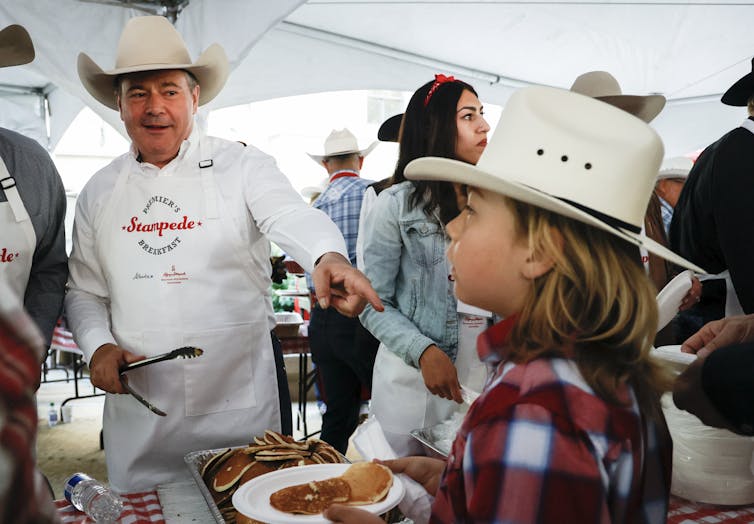
In October, members of Alberta’s governing United Conservative Party (UCP) will elect a new leader who will then become Alberta’s next premier.
A defining issue in this leadership race is Alberta’s place in Canadian Confederation, with several contenders openly discussing “sovereignty,” “autonomy” and even “independence.”
Are Albertans really so keen to sever ties with the rest of Canada? Should Canadians pay much attention to the separatist movement in Alberta? To answer these questions, we looked at data from the recent Viewpoint Alberta survey.

Separatism and the economy
Support for separation remains a minority view in the province, with one in five believing Alberta “should separate from Canada and form an independent country.”
This is a small base from which to build a province-wide following. Yet separatists make up one-third of UCP voters — a sizeable constituency for would-be leaders to court.

What motivates these Albertans to take such a drastic position?
Unlike sovereigntists in Québec motivated by a desire to protect their culture, we find Alberta separatists are preoccupied with fiscal and economic issues.
According to our research, Alberta’s separatist movement is also grounded more in party politics than it is in nationalism.
Separatists place themselves further to the right than other Albertans. They are more likely to support conservative political parties both federally and provincially. And they strongly dislike the federal government and Justin Trudeau.
How committed are Alberta separatists?
In our analysis, we found two clues that suggest support for separatism is less a heartfelt desire to form a new country and more a tactical expression of grievances.
The first is that most Albertans – including the separatists themselves – think separation is unlikely. Barely one in 10 separatists think Alberta independence is “very likely” or “will happen.”
The second clue is that the majority of the separatists (62 per cent) retain a sense of attachment to Canada. Separatists are simply angrier and more pessimistic about the country’s future.
They haven’t turned their backs entirely on Canada; they feel it’s headed in the wrong direction and in need of radical reform.

Pessimism and mistrust
Most separatists’ worldviews are grounded in a sense of status loss and mistrust for institutions that has fuelled populist movements elsewhere in the world.
They are more likely to feel like they are falling behind others in society, and they have very little confidence in governments and elites. These suspicions drew most separatists into supporting the so-called freedom convoy that occupied Ottawa for weeks in February 2022.
Read more: What the truck? The 'freedom convoy' protesters are heading back to Ottawa
Separatists stood out in their belief that the most recent federal election was unfair. This may be because their favoured party lost despite winning more votes, or a belief in conspiracy theories spread by right-wing news outlets.
Whatever the reason, this low level of trust — combined with a deep sense of pessimism about the future — has sparked movements like Brexit and Trumpism in other parts of the world.
Separatism in Alberta
While support for separation is a minority view in Alberta, it’s not a fringe position. An overwhelming majority of separatists support the UCP provincially and make up a substantial part of its base of support.

Such a large voting bloc is enticing to leadership contenders. Veiled promises to restore Alberta’s “sovereignty” or secure greater “autonomy” can help sell party memberships. They may even lead to victory in the UCP race, creating pressure for the winner to deliver on promises that are politically and constitutionally impossible.
But our research tells us that flirting with separatism is likely to fall flat — if not backfire entirely — during a provincial election.
The broader Alberta electorate is federalist. The majority do not support measures that would further divide the province from Canada.
Eighty per cent of Albertans reject separation, and solid majorities also oppose abandoning the Canada Pension Plan, the RCMP and federal income tax collection. Most opposed the “freedom convoy” and what it stood for, and the majority have confidence in most political institutions.
Candidates running for the UCP leadership have a choice. They can pay lip service to populist and sovereigntist positions to gain internal party support. Or they can resist that temptation with an eye to winning the next provincial election, preserving national unity and strengthening democratic institutions in the process.
Implications for Canada
Canadians outside Alberta should keep a careful eye on this dynamic. Even though they lack the profile of Québec sovereigntists, Alberta separatists are positioned to exert significant political influence on intergovernmental relations in the years to come.
How much influence depends on the commitments made by the eventual winner of the UCP leadership race, and the response from the rest of Canada to their push for a fairer deal in Confederation.
If the next premier is unable to deliver on their promises by securing meaningful concessions from the rest of Canada, separatists would be further alienated from the democratic process. Their disappointment might lead to further civil unrest like what we saw from the “freedom convoy,” adding fuel to the politics of resentment.
Jared Wesley receives funding from the Social Sciences and Humanities Research Council, the Kule Institute for Advanced Study, and the Killam Trust.
Lisa Young does not work for, consult, own shares in or receive funding from any company or organisation that would benefit from this article, and has disclosed no relevant affiliations beyond their academic appointment.
This article was originally published on The Conversation. Read the original article.


.png?w=600)




